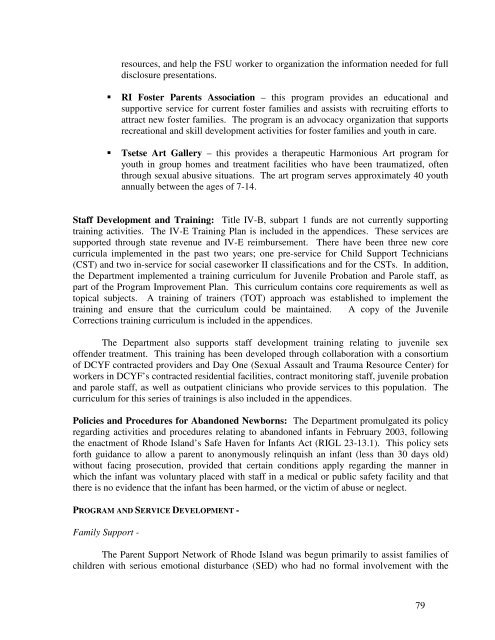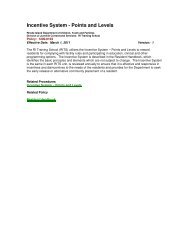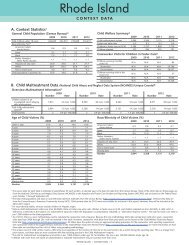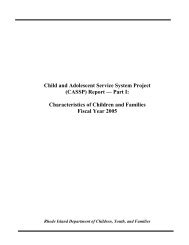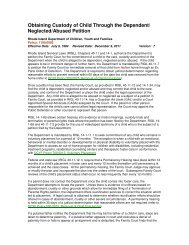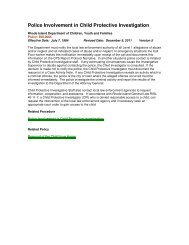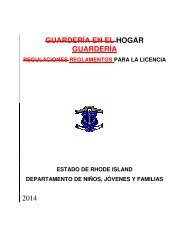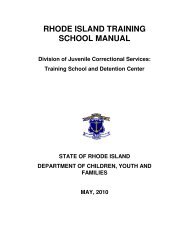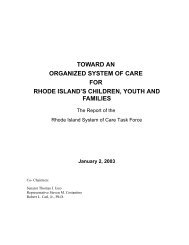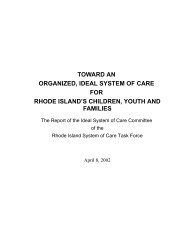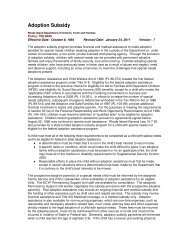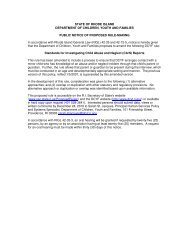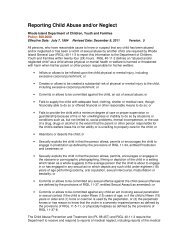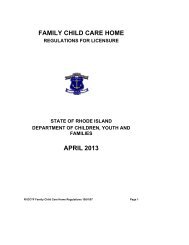CFSP 5 Year Plan - RI Department of Children, Youth & Families
CFSP 5 Year Plan - RI Department of Children, Youth & Families
CFSP 5 Year Plan - RI Department of Children, Youth & Families
Create successful ePaper yourself
Turn your PDF publications into a flip-book with our unique Google optimized e-Paper software.
esources, and help the FSU worker to organization the information needed for full<br />
disclosure presentations.<br />
<strong>RI</strong> Foster Parents Association – this program provides an educational and<br />
supportive service for current foster families and assists with recruiting efforts to<br />
attract new foster families. The program is an advocacy organization that supports<br />
recreational and skill development activities for foster families and youth in care.<br />
Tsetse Art Gallery – this provides a therapeutic Harmonious Art program for<br />
youth in group homes and treatment facilities who have been traumatized, <strong>of</strong>ten<br />
through sexual abusive situations. The art program serves approximately 40 youth<br />
annually between the ages <strong>of</strong> 7-14.<br />
Staff Development and Training: Title IV-B, subpart 1 funds are not currently supporting<br />
training activities. The IV-E Training <strong>Plan</strong> is included in the appendices. These services are<br />
supported through state revenue and IV-E reimbursement. There have been three new core<br />
curricula implemented in the past two years; one pre-service for Child Support Technicians<br />
(CST) and two in-service for social caseworker II classifications and for the CSTs. In addition,<br />
the <strong>Department</strong> implemented a training curriculum for Juvenile Probation and Parole staff, as<br />
part <strong>of</strong> the Program Improvement <strong>Plan</strong>. This curriculum contains core requirements as well as<br />
topical subjects. A training <strong>of</strong> trainers (TOT) approach was established to implement the<br />
training and ensure that the curriculum could be maintained. A copy <strong>of</strong> the Juvenile<br />
Corrections training curriculum is included in the appendices.<br />
The <strong>Department</strong> also supports staff development training relating to juvenile sex<br />
<strong>of</strong>fender treatment. This training has been developed through collaboration with a consortium<br />
<strong>of</strong> DCYF contracted providers and Day One (Sexual Assault and Trauma Resource Center) for<br />
workers in DCYF’s contracted residential facilities, contract monitoring staff, juvenile probation<br />
and parole staff, as well as outpatient clinicians who provide services to this population. The<br />
curriculum for this series <strong>of</strong> trainings is also included in the appendices.<br />
Policies and Procedures for Abandoned Newborns: The <strong>Department</strong> promulgated its policy<br />
regarding activities and procedures relating to abandoned infants in February 2003, following<br />
the enactment <strong>of</strong> Rhode Island’s Safe Haven for Infants Act (<strong>RI</strong>GL 23-13.1). This policy sets<br />
forth guidance to allow a parent to anonymously relinquish an infant (less than 30 days old)<br />
without facing prosecution, provided that certain conditions apply regarding the manner in<br />
which the infant was voluntary placed with staff in a medical or public safety facility and that<br />
there is no evidence that the infant has been harmed, or the victim <strong>of</strong> abuse or neglect.<br />
PROGRAM AND SERVICE DEVELOPMENT -<br />
Family Support -<br />
The Parent Support Network <strong>of</strong> Rhode Island was begun primarily to assist families <strong>of</strong><br />
children with serious emotional disturbance (SED) who had no formal involvement with the<br />
79


